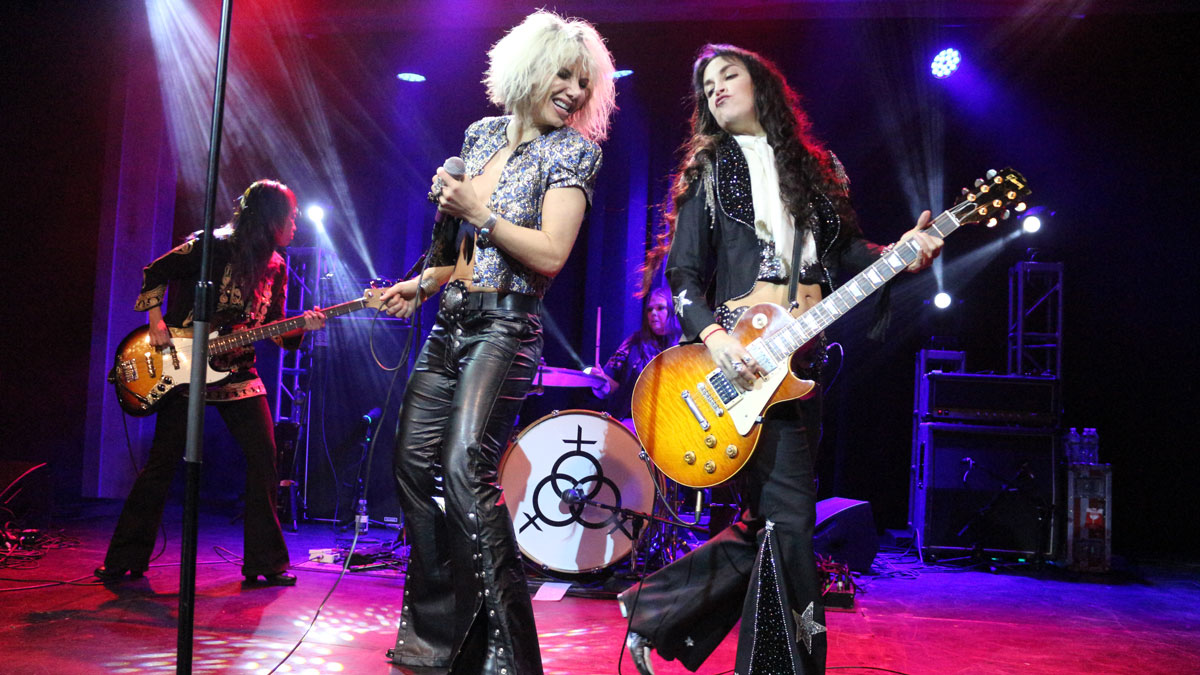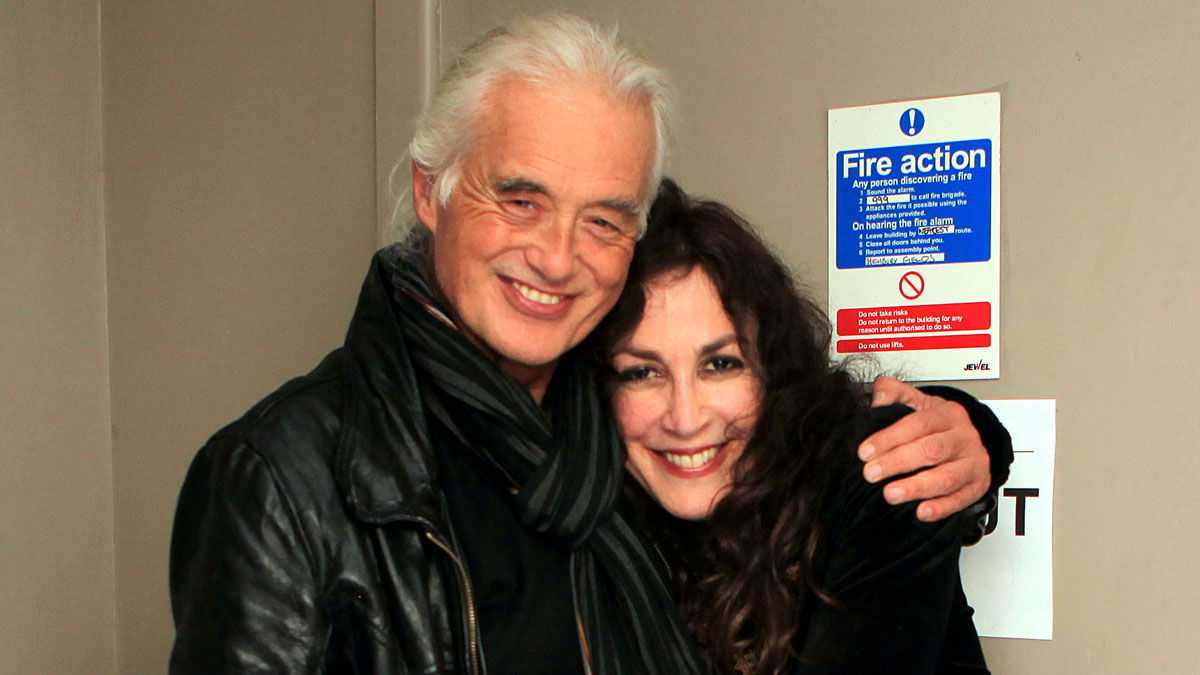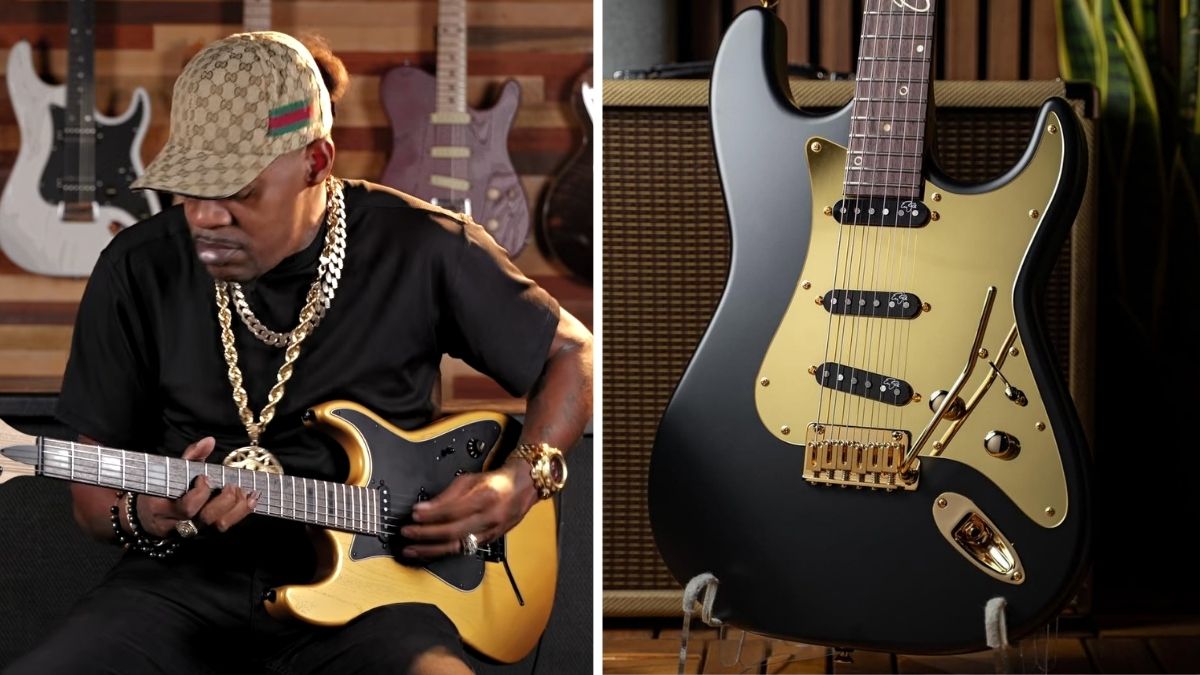Lez Zeppelin's Steph Paynes: this is what it takes to play and sound just like Jimmy Page
The Led Zeppelin legend's favorite tribute act on the technique, gear and swagger you need to capture his style

As the founding member of Lez Zeppelin – New York’s all-female tribute to one of the most influential bands in music history – Steph Paynes could be considered a world authority on the art of Jimmy Page.
After securing Eddie Kramer, who famously worked with the rock ’n’ roll originals, to produce their first album in 2007 at Electric Lady Studios and then recreating Led Zeppelin’s 1968 debut in its entirety using the same analogue equipment in 2010, few could rival her insight into the inner-workings of her electric guitar hero…
The band’s latest recordings, The Island Of Skyros EP, offers more Led Zep worship albeit through a classical lens, incorporating a string quartet within the famous classics virtually every rock band will directly or indirectly be in debt to.
Their efforts have not been in vain. Lez Zeppelin have appeared on major media networks and graced the stages of events like Download Festival and venues like Madison Square Garden. The quartet have even performed in front of Page himself, who praised the group for playing his music “with an extraordinary sensuality and an energy and passion that highlight their superb musicianship.”
Looking back on her journey so far, Payne explains how the project got started, the secrets to sounding like a bona-fide guitar god and what it was like meeting the very man she had been paying tribute to…
What do you remember about the very first time you heard Led Zeppelin?
The funny thing about Kashmir is there isn’t even a guitar solo
“It was probably Kashmir because Physical Graffiti was the first album I got into - which is the one we’re doing in its entirety right now. It seems to be a lot of people’s favorite Zeppelin album because there’s more of it. I think it exemplifies what that band are, covering everything that they did in one release.
All the latest guitar news, interviews, lessons, reviews, deals and more, direct to your inbox!
“Kashmir put me in a trance… it was so exotic-sounding. It had something different to everything else, even of its era, trying to pinpoint all of those things is like a quest. There was a magical alchemy coming from those four guys playing. Kashmir has the power to transport you.
“The funny thing about that is there isn’t even a guitar solo. He didn’t really alter between the main guitar parts, which are almost atmospheric, underneath and supporting the keyboards and strings and vocals. Jimmy could build textures and if the guitars needed to be a certain way, he wouldn’t be trying to change that. He didn’t fall into the traps that most guitarists do.”
And then, some years later in 2004, you formed your own tribute band…
“Yes, this band started quite a bit later, after I’d been playing lots of other kinds of music. I was gifted this master boxset, around 1992 when they first remastered all the records. I almost couldn’t believe how great it was, re-listening to it all. I then started going into the deeper cuts I hadn’t heard before like In Through The Out Door or Coda, which sorta get ignored!
“Everything they did felt so much better than anything else. Even in a post-grunge context, there was so much more depth. So I started getting back into this much later, rediscovering the breadth of what they were. All the things Jimmy was doing as the sole guitarist. I thought I’d learn that style, get my chops up and have fun with it. That’s how the band was born. Just my idiot idea of thinking let’s go out there, form a band and make it all girls, which is much more fun!”

When did you first get to meet them?
“I’d met John Paul Jones at the afterparty of the London O2 Arena reunion show. He said, ‘Oh yeah, Lez Zeppelin, I’d love to see you play!’ I nearly fainted. And then with Jimmy, it was around 2012 when Celebration Day came out. We’d been communicating with a little, but we’d never met.
“I somehow got a pass to the afterparty and finally they all came in. Then Jimmy walks in and someone ushered me over because it was like the bees swarming in around him. We were introduced and he embraced me and remembered my band. I held his hand and said, ‘Jimmy… I really gotta tell you, it’s really hard being you!’ And he said, ‘Yeah... it is!’ It was so funny.
“He thought what we were doing fantastic and stunning, while I got to say how much his music meant to me. Then he walked around the room and came back to talk some more. He had already tried to make some of our shows, so he definitely knew about us.
“Here’s my theory about Led Zeppelin: if anything happens that has anything to do with the band, Jimmy will know about it. Someone says his name in the depths of South Africa and he’ll know they were mentioned in some newspaper.”
You’ve experimented a lot in the studio, trying to recreate the legendary recordings. What have you found to be the best amp for nailing Jimmy’s sound?
Of course, the recipe is the Plexi and the Les Paul, but every Plexi is different
“It depends. Of course, the recipe is the Plexi and the Les Paul, but every Plexi is different. Nothing will sound exactly like him like his own Plexi and his own '59. There needs to be a bit of a twang or edge to it; there’s quite a sharpness to his sound. The stinging treble that brings this powerful clarity.
“I played through Orange for a bit, which he even used when they played at the O2, but they’re much softer, British invasion-sounding. They don’t quite have the same bite. That brings a lot of his sound…
“I have a vintage Plexi at home that sounds right. But here’s the problem: it has to be super-loud because that’s how Jimmy gets his tone. I don’t like using power breaks, so you can’t really bring amps like that to any normal venue. Even at a theater, you won’t be mic’d if you crank it that loud.
“The closest I’ve gotten recently has actually been using my JCM800. It has two channels and I can get a lot of the overdrive from the amp. That probably feels as close as I get on stage…”
Though Jimmy was incredibly experimental for his time, his use of effects might be considered more minimal by today’s standards…
“Exactly. That’s another aspect of his sound: he actually played the guitar, probably out of pure necessity at the time. He didn’t have a million pedals to change tones. He’d use his Vox wah, sometimes even just leaving it on somewhere between the middle and high to give it a particular sound. There’s a Phase 90 pedal he used, which I also have. There’s also an MXR Blue Box on the Fool In The Rain solo. There wasn’t much else…
“He mainly used an Echoplex, no reverb. What you hear is the way it almost works like a preamp; even if you don’t use the echo, it adds this depth and sting. His delay was something like a quarter-note, more like a slapback but quite light; you don’t want to hear too much of it, just the depth behind your note. That should be the last in the chain going into the amp.
“I have a Klon pedal, not the Centaur, but the KTR which has almost the same circuitry. It might even be better, though it doesn’t have the mythological money surrounding it. That gets used to boost my amp when I can’t turn up.”
Do you have one favorite Les Paul - one guitar that nails the Led Zep tones better than anything else?
“I love my main Standard. It’s rigged up to be more like his instruments; there’s no push/pull pots. I put those in my Custom but never really used them. I have the tapered pots; you have to change that on every new Gibson. And that’s what he used: it brings that boost and fuzz from eight to 10.
I prefer slimmer necks, just like Jimmy. Weirdly, we’re quite similar with long arms and skinny fingers. I also have a Dragon Tele, which covers me for the first Led Zeppelin album- that’s the sound. Of course, I have the double-neck, which is a pain in the ass. And a Danelectro, which I love.
To be honest, you can have all the right gear and ‘get it’ to a certain extent, but you’ll never exactly nail his phrasing and clarity
“To be honest, you can have all the right gear and ‘get it’ to a certain extent, but you’ll never exactly nail his phrasing and clarity. There’s this kind of swing to his playing, as well as John Bonham’s playing, that a lot of people don’t quite hear. Or maybe they hear it but still can’t quite do it.
“It’s almost unnatural for a lot of people. Even some jazz players find it hard to lay back and get in that zone, finding a way to be almost off… that lag is what brings all that feel, sexiness and tension.”
Jimmy often blended both major and minor tonalities in his lead work. How much homework did it take to understand the more theoretical side of it?
“Honestly, and this sounds awful, but I probably couldn’t get a degree in guitar! I don’t think about scales and just play by ear. I can read tab… slowly and maybe some piano music because I did play that for a while. Mainly I just listen to him and try to understand how he’s doing what he does, rather than what he actually does.
“His style is more intuitive, anyway. Since I’ve Been Loving You has a great blues solo - it’s a great one to study because it’s structured in a way that doesn’t feel like a straight pentatonic thing. He goes into all of these other avenues that make it so startling and beautiful. Learning all of his parts has made me now feel like I know his language, regardless of the theory.”
What do you feel are the hardest Led Zeppelin songs to learn?
The Song Remains The Same is where you really start to separate the girls from the women!
“The Song Remains The Same can be quite technically challenging, especially for feel. He starts roaming out of the pentatonic scale, and that’s where you really start to separate the girls from the… women [laughs]!
“Since I’ve Been Loving You is another showpiece that’s formidable. You have to play without abandon to get it right. When he launches into the solo, even he pauses for a second, because it’s almost like jumping off a cliff. It needs to be played without being thought about too much, like a lot of blues playing. It’s that kind of Jimi Hendrix-y approach that’s completely expressive.
“The Ocean is another: it swings but it should sound stiff, too - it’s abbreviated, short and sharp. Then there’s all the funky stuff, like Hots On For Nowhere, which is really behind the beat. It’s hard to find players that are as rounded, plus there’s all his Celtic folk stuff. What about pieces like White Summer, where he goes into this modal stuff in alternate tunings? It’s beautiful and a lot of fun to learn.”
Some of his most magical playing almost feels as if he was making it up as he went along…
“Your ear is so much of it. That’s how players of this era learned to play. They’d sit around copying their favorite blues guys, I imagine them all sitting around having a tea party listening to records. They were coming up with new things with this intuitive ballsiness. I don’t play it note-for-note live, like some people do…
“There’s a guy from Japan called Mr. Jimmy who plays it all exactly… I know him and he’s great! I don’t mean this in a negative way, he’s an impersonator – everything from the shoes, the strap to the pick is exactly like the real Jimmy. He knows every note off every version of these solos. I wouldn’t find that fun, I study the music and then find my own voice within it. Even Jimmy didn’t always play it the same way. My dream is to learn the language and be authentic to it. You fall into it. That’s even better than copying it.”
And, for many, even copying it can be extremely challenging in places…
When we redid Led Zeppelin’s first album, we went to absolute pure imitation of sound to the nth degree
“I dare you all to play Whole Lotta Love the right way! There are all these weird nuances to it.
“When we redid Led Zeppelin’s first album, we went to absolute pure imitation of sound to the nth degree. We’d use the same vintage guitars and amplifiers and spend hours getting the tone right, matching it to the record. The ear training was amazing.
“I’d record parts realizing some things were just not right, like Communication Breakdown which sounds easy but actually the big chords were done on an upstroke. And something little like that can change the whole thing, especially if you start getting really into this shit!
“I also feel not enough people talk about his blues playing. I think because he mastered so many styles, people sometimes forget how otherworldly his live versions of Since I’ve Been Loving You or I Can’t Quit You Baby are – the second version of that on the BBC Sessions is outrageous. Some of the best playing he ever did, partly because of how the band were playing together. They went so far into the conversation on that one tape. It’s quintessential group playing.”
Do you think they will ever perform again?
“Who knows… maybe they’ll do something like the O2 again. I’m not sure. Everyone has a theory and maybe they’re all true in some way. Led Zeppelin stopped in 1980 when John Bonham died. That’s really it.
Look at it this way: they don’t want to compromise their legacy and good for them
“There was something about the alchemy of that band. They didn’t think they could get back there. John Bonham was a key member, there was something elusive about his playing, the way it would swing, which is irreplaceable.
“Maybe Robert won’t go back. Maybe he doesn’t want to do it or there are some personal things. Look at it this way: they don’t want to compromise their legacy and good for them.”
Finally, what are your thoughts of Greta Van Fleet, the band currently being hailed as the new Led Zeppelin?
“I want to start with a disclaimer, I’m not deeply familiar with their music, but I’ve seen some footage of them including the Saturday Night Live performance which most would agree wasn’t their best moment. I don’t feel their music is like Led Zeppelin, it’s derivative of it but I don’t feel it has the depth of it.
“I guess it’s a different band and the closest thing in the group to Zeppelin is their singer. We’ll have to see what they do next and watch how they progress. It’s one thing to have a garage-y attitude and wear similar clothing, making noise reminiscent of that era, but you can’t really compete with the four guys who were the undisputed masters of what they did…”
Amit has been writing for titles like Total Guitar, MusicRadar and Guitar World for over a decade and counts Richie Kotzen, Guthrie Govan and Jeff Beck among his primary influences as a guitar player. He's worked for magazines like Kerrang!, Metal Hammer, Classic Rock, Prog, Record Collector, Planet Rock, Rhythm and Bass Player, as well as newspapers like Metro and The Independent, interviewing everyone from Ozzy Osbourne and Lemmy to Slash and Jimmy Page, and once even traded solos with a member of Slayer on a track released internationally. As a session guitarist, he's played alongside members of Judas Priest and Uriah Heep in London ensemble Metalworks, as well as handled lead guitars for legends like Glen Matlock (Sex Pistols, The Faces) and Stu Hamm (Steve Vai, Joe Satriani, G3).




